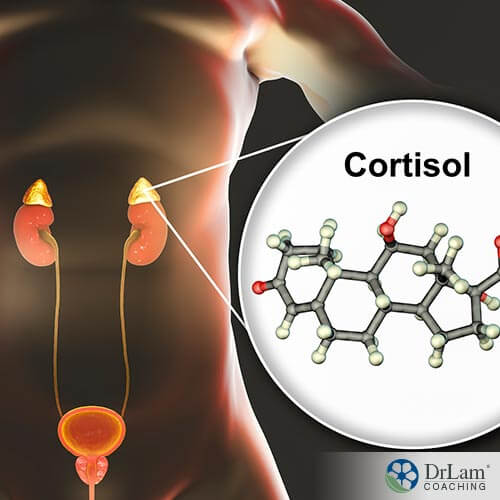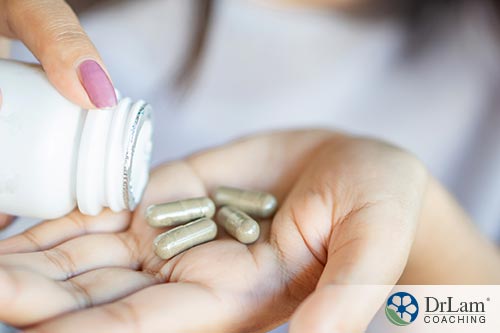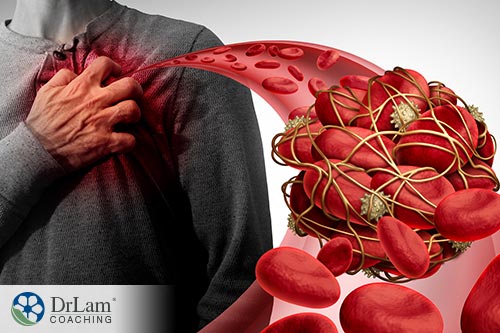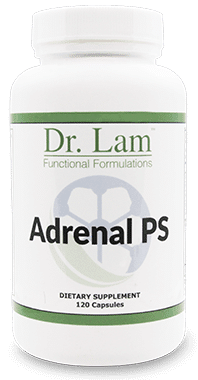 Phosphatidylserine, a phospholipid that covers and protects your brain cells, also acts as a neurotransmitter in the brain. This means that it carries chemical messages between these individual cells. But this phospholipid’s most important function is probably its Neuroaffect capability. And this is because it plays an important role in preserving cognitive function. Interestingly, studies indicate that your brain’s phosphatidylserine levels may decrease with age. Now let's discuss how phosphatidylserine affects your cortisol levels.
Phosphatidylserine, a phospholipid that covers and protects your brain cells, also acts as a neurotransmitter in the brain. This means that it carries chemical messages between these individual cells. But this phospholipid’s most important function is probably its Neuroaffect capability. And this is because it plays an important role in preserving cognitive function. Interestingly, studies indicate that your brain’s phosphatidylserine levels may decrease with age. Now let's discuss how phosphatidylserine affects your cortisol levels.
Probably the most common reason for using a phosphatidylserine supplement is to prevent memory loss. Also, several studies suggest it may boost brain power and that it may improve concentration, short-term memory, and even mood. This implies that it may benefit your Neuroaffect Circuit function.
Thus far, studies suggest a phosphatidylserine supplement may benefit those with multiple sclerosis and Lyme disease. That it would help for both these health issues makes sense because the two conditions have much in common. For example, Lyme disease can cause numerous neurological symptoms that are similar to those experienced by when suffering from multiple sclerosis. These include feelings of weakness, blurred vision, confusion, cognitive dysfunction, fatigue, itchiness, burning sensations, and pins and needles. Please note these symptoms are also present in adrenal fatigue sufferers, with Lyme disease and multiple sclerosis being possible symptoms or the condition. Both could, however, also negatively affect the health of those suffering from adrenal fatigue.
And then there is the use of a phosphatidylserine supplement to heal muscle soreness and stress due to overtraining. And this is where it gets interesting and where mood enhancement could come into the picture.
Many athletes take a phosphatidylserine supplement in the belief it will help to build up muscles and give them a competitive edge. The hope persists that this natural supplement may minimize muscle breakdown while training so that they will become stronger and, by association, better in their sport.
However, it is always best to know how a supplement works before actually using it.
You see, phosphatidylserine, when taken before exercising, could lower your body’s cortisol production by up to 70%. Now, while athletes like this because cortisol causes muscles to break down, this lower cortisol production may have both positive and negative consequences for those suffering from adrenal fatigue as well as its myriad symptoms and associated health conditions.
Now, in an athlete, the lower cortisol production means that the smaller percentage of muscle material breaking down results in an increase in total muscle growth. For his sport, this may be wonderful. But there is a catch. And this is that a lower cortisol level has its own set of risks and symptoms attached.
 Your cortisol levels are largely influenced by stress which, once perceived in your brain’s hypothalamus as part of the Hypothalamic-Pituitary-Adrenal (axis), sees chemical messengers speeding to different areas of your body to get your fight or flight response up and running. This immediate, automatic response is also known as your NeuroEndoMetabolic (NEM) stress response.
Your cortisol levels are largely influenced by stress which, once perceived in your brain’s hypothalamus as part of the Hypothalamic-Pituitary-Adrenal (axis), sees chemical messengers speeding to different areas of your body to get your fight or flight response up and running. This immediate, automatic response is also known as your NeuroEndoMetabolic (NEM) stress response.
One of the many differences during this period is the higher cortisol production in your adrenal glands. Together with the elevated cortisol production we also see the activation of your sympathetic nervous system. Your heart rate, blood pressure, and breathing rate all increase during this time.
But if this state stays constant over a long period, certain health issues crop up because staying in a state of constant readiness is certainly not normal. Besides the many symptoms that arise due to constantly high cortisol production and the resultant changes in other body functions, your adrenal glands work overtime. This could lead to a condition known as Adrenal Fatigue Syndrome (AFS).
In time, your adrenal glands become unable to keep up with the high cortisol demand. Adrenal fatigue now has another face, i.e. one where cortisol production goes down.
One might think this decline in cortisol is a good thing, but it is not. Lower cortisol production, as often seen during the latter stages of AFS, could have devastating consequences on your overall health. All body systems may start to dysregulate, and an adrenal crash may also occur.
We have established that phosphatidylserine as a supplement may help reduce cortisol levels in the body, something many sportsmen want to build up muscle.
However, it may also play a significant role in bringing down cortisol levels during the initial stages of adrenal fatigue when cortisol levels are at their highest. In so doing, it may help alleviate many of the symptoms associated with adrenal fatigue at this time, including anxiety, depression, mood swings, and many others. So, in a nutshell, high cortisol levels may result in many mood-related symptoms. This implies lower cortisol levels may see a decrease in these symptoms. Indeed, phosphatidylserine may preserve and protect your brain's neuronal cells, thereby giving your body time to recover from stress. Which is what we may want, right?
But what if the pendulum swings in the opposite direction?
Taking phosphatidylserine during the latter stages of adrenal fatigue could have devastating consequences, further reducing already low cortisol levels, increasing inflammation throughout the body, and contributing towards a possible adrenal crash. Furthermore, some people may develop paradoxical reactions. Instead of lowering cortisol, it rises. If a person has been on a cortisol-lowering supplement for some time or has already had high cortisol, an attempt to lower it may trigger an adrenal crash. Cortisol adjustment is therefore not as simple as taking phosphatidylserine supplement. Many have tried and they felt worse.
If you suffer from adrenal fatigue, please first talk to a healthcare practitioner before considering taking a phosphatidylserine supplement as sometimes trying to modulate your cortisol levels on your own could lead to feeling worse.
 If you have read up to here, it means that you are not scared of lowered cortisol levels or that you are actively looking to lower your cortisol levels, and you have become interested in purchasing this supplement. But what supplement should you choose? There are two ways to get phosphatidylserine into your system:
If you have read up to here, it means that you are not scared of lowered cortisol levels or that you are actively looking to lower your cortisol levels, and you have become interested in purchasing this supplement. But what supplement should you choose? There are two ways to get phosphatidylserine into your system:
A phosphatidylserine phospholipid compound is made of one glycerol, two fatty acids, and one phosphorylated molecule. Once taken, your body’s digestive process effectively cuts off the glycerol and fatty acids before absorption takes place. But, once your body needs phosphatidylserine, it simply adds them again from either your food or body fat. In other words, the compound is broken up into its various components and stored until needed.
Although highly effective in cortisol regulation, phosphatidylserine is derived from animal tissue. This means the fatty acids in this form of the supplement may oxidize.
Phosphorylated serine is a special form of phospholipid. it is similar in action but not the same as phosphatidylserine. When you take a phosphorylated serine supplement, you stimulate your body to produce phosphatidylserine. Furthermore, the fatty acids in this supplement do not come from animal sources but entirely from plant sources. This means that the fatty acids are unlikely to oxidize and become rancid. Furthermore, its absorption does not depend on the availability of gut enzymes.
Both forms have their use. Choosing the right form is important as the wrong form may not be tolerated and adrenal crashes may be triggered.
Adrenal PS is a blend of phosphorylated serine and other minerals. The phosphorylated serine blend includes disodium phosphate, tricalcium phosphate, dipotassium phosphate, magnesium oxide, monosodium phosphate, dicalcium phosphate, potassium phosphate, l-serine, rice flour, dimagnesium phosphate, magnesium 2-AEP, and calcium 2-AEP. Do remember that phosphorylated serine is the active form and not the precursor which is phosphatidylserine. Also, absorption of this product depends on the enzyme component in your gastrointestinal tract.
If considering the use of either of these supplements, please first talk to your healthcare practitioner. Establishing a dosage is exceedingly difficult otherwise. They may be better equipped to determine whether you could benefit from these supplements. In addition to choosing the right form, the proper timing and dosage must be customized to fit the body's needs. The dosage range varies widely, and there is no one size fits all.
Please beware that you should rather not consider using these supplements if you:
 If seeing a healthcare practitioner about these supplements, please do remember to tell them about any medications or supplements you take. Any medications or supplements, when combined with others, may have interactions or side effects that you didn't know about beforehand. Your healthcare professional would know about these and give you effective advice in this regard.
If seeing a healthcare practitioner about these supplements, please do remember to tell them about any medications or supplements you take. Any medications or supplements, when combined with others, may have interactions or side effects that you didn't know about beforehand. Your healthcare professional would know about these and give you effective advice in this regard.
Please also take note that using phosphatidylserine may have its own set of side effects besides those discussed. You could, for example, have trouble sleeping, an upset stomach, and have more gas than usual. This is usually the exception and not the norm, however.
If suffering from high cortisol levels and want to use a phosphatidylserine supplement, here are a few things to keep in mind.
You may have several reasons to consider using a phosphatidylserine supplement and thereby increase your general health. But whatever the reason, please talk to a qualified healthcare practitioner first.
If you would like to know more about or need assistance with phosphatidylserine and its potential usefulness, the team at Dr. Lam Coaching can help. We offer a free** no-obligation phone consultation at +1 (626) 571-1234 where we will privately discuss your symptoms and various options. You can also send us a question through our Ask The Doctor system by clicking here.

Modulate cortisol naturally
Yes, a phosphatidylserine supplement may affect your adrenal fatigue symptoms. If in the beginning stages of adrenal fatigue, the lower cortisol levels may support adrenal health. Taken during the latter stages of the condition, the supplement could cause an adrenal crash because it would reduce the already low cortisol levels.